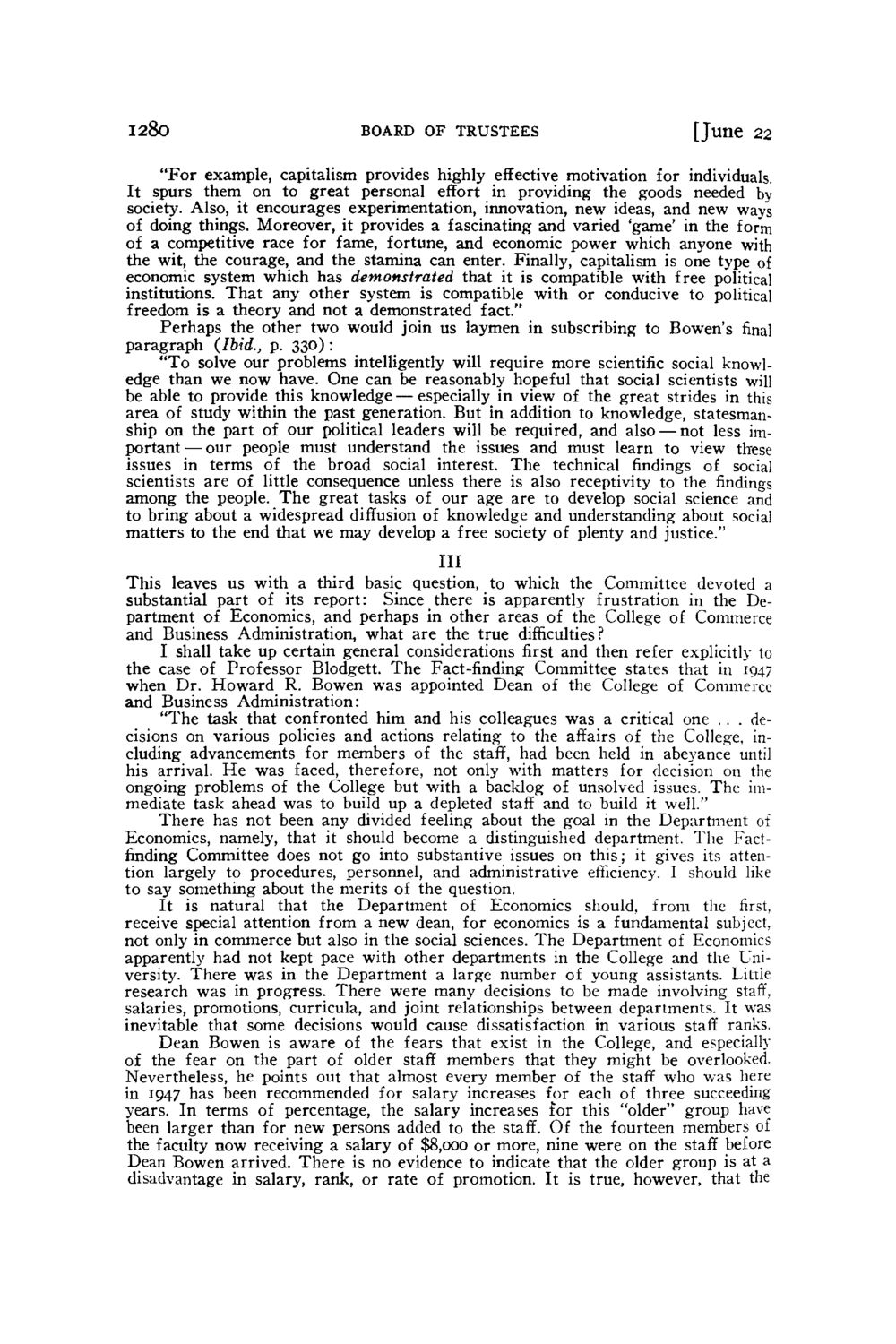| |
| |
Caption: Board of Trustees Minutes - 1950
This is a reduced-resolution page image for fast online browsing.

EXTRACTED TEXT FROM PAGE:
I280 BOARD OF TRUSTEES [June 22 "For example, capitalism provides highly effective motivation for individuals. It spurs them on to great personal effort in providing the goods needed by society. Also, it encourages experimentation, innovation, new ideas, and new ways of doing things. Moreover, it provides a fascinating and varied 'game' in the form of a competitive race for fame, fortune, and economic power which anyone with the wit, the courage, and the stamina can enter. Finally, capitalism is one type of economic system which has demonstrated that it is compatible with free political institutions. That any other system is compatible with or conducive to political freedom is a theory and not a demonstrated fact." Perhaps the other two would join us laymen in subscribing to Bowen's final paragraph (Ibid., p. 330): "To solve our problems intelligently will require more scientific social knowledge than we now have. One can be reasonably hopeful that social scientists will be able to provide this knowledge — especially in view of the great strides in this area of study within the past generation. But in addition to knowledge, statesmanship on the part of our political leaders will be required, and also — not less important— our people must understand the issues and must learn to view these issues in terms of the broad social interest. The technical findings of social scientists are of little consequence unless there is also receptivity to the findings among the people. T h e great tasks of our age are to develop social science and to bring about a widespread diffusion of knowledge and understanding about social matters to the end that we may develop a free society of plenty and justice." Ill This leaves us with a third basic question, to which the Committee devoted a substantial part of its report: Since there is apparently frustration in the Department of Economics, and perhaps in other areas of the College of Commerce and Business Administration, what are the true difficulties? I shall take up certain general considerations first and then refer explicitly to the case of Professor Blodgett. The Fact-finding Committee states that in 1947 when Dr. Howard R. Bowen was appointed Dean of the College of Commerce and Business Administration: "The task that confronted him and his colleagues was a critical one . . . decisions on various policies and actions relating to the affairs of the College, including advancements for members of the staff, had been held in abeyance until his arrival. H e was faced, therefore, not only with matters for decision on the ongoing problems of the College but with a backlog of unsolved issues. The immediate task ahead was to build up a depleted staff and to build it well." There has not been any divided feeling about the goal in the Department of Economics, namely, that it should become a distinguished department. The Factfinding Committee does not go into substantive issues on this; it gives its attention largely to procedures, personnel, and administrative efficiency. I should like to say something about the merits of the question. It is natural that the Department of Economics should, from the first, receive special attention from a new dean, for economics is a fundamental subject, not only in commerce but also in the social sciences. The Department of Economics apparently had not kept pace with other departments in the College and the University. There was in the Department a large number of young assistants. Littie research was in progress. There were many decisions to be made involving staff, salaries, promotions, curricula, and joint relationships between departments. It was inevitable that some decisions would cause dissatisfaction in various staff ranks. Dean Bowen is aware of the fears that exist in the College, and especially of the fear on the part of older staff members that they might be overlooked. Nevertheless, he points out that almost every member of the staff who was here in 1947 has been recommended for salary increases for each of three succeeding years. In terms of percentage, the salary increases for this "older" group have been larger than for new persons added to the staff. Of the fourteen members of the faculty now receiving a salary of $8,000 or more, nine were on the staff before Dean Bowen arrived. There is no evidence to indicate that the older group is at a disadvantage in salary, rank, or rate of promotion. It is true, however, that the
| |